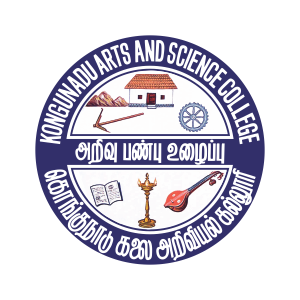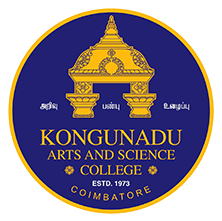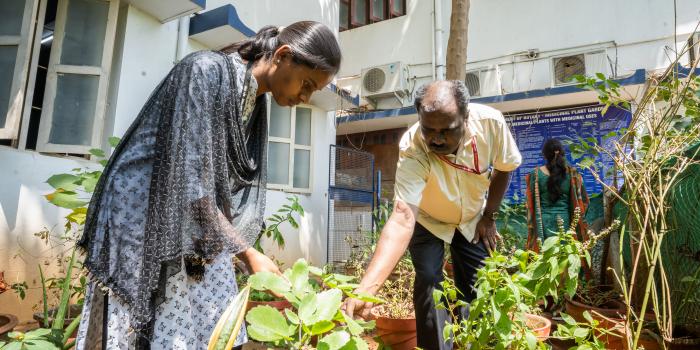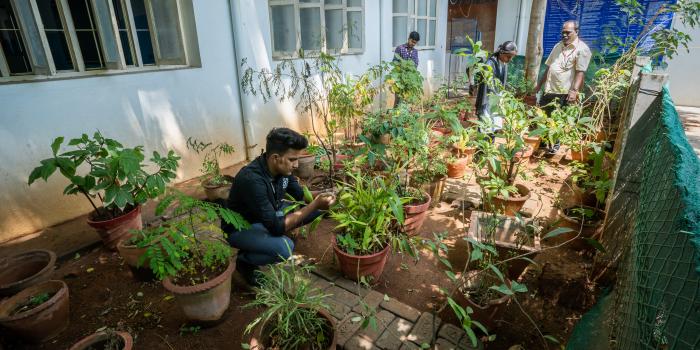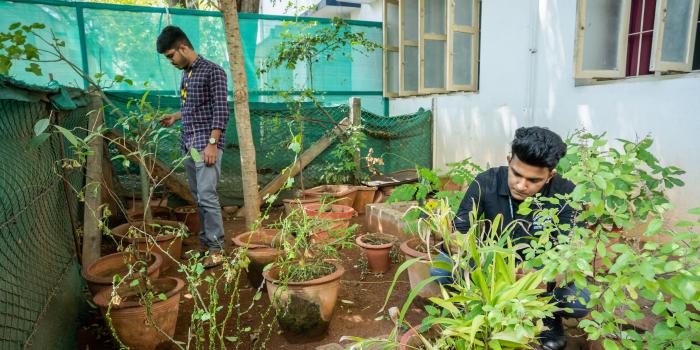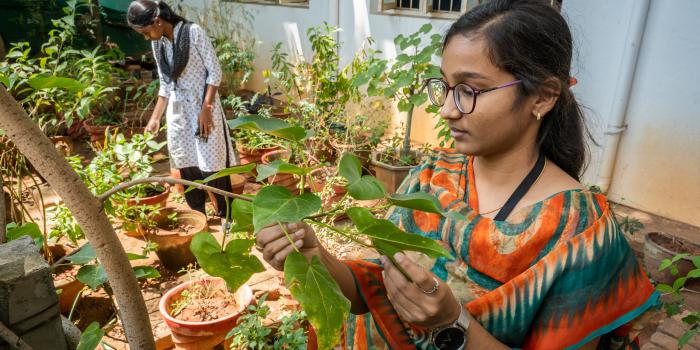- B.Sc Botany
-
Eligibility:
- A candidate who have passed HSC (Both First & Second year) with Botany & Chemistry (OR) Biology & Chemistry
Duration: 3 Years
Sanctioned Strength : 50
Educational Objectives of B.Sc. (Botany) Programme:
- To pursue their academic career and become a successful professionals in various fields of Plant Sciences
- To improve life long learning opportunities and enrich their technical and professional skills
- Augmenting societal responsibilities and leadership roles
- Adhere to professional code of ethics
Program Specific Outcomes (PSOs)
- Through taxonomy, students aware about the local and scientific names, economic importance including the uses and variations among the different species of Angiosperms.
- Students can able to apply and associate the knowledge acquired from the allied subjects viz. Zoology and Chemistry, to solve and arrive at conclusion through interdisciplinary approach.
- Plant physiology aids the students to enhance knowledge on pathways of metabolisms, transport and translocation of water and solutes together with a better understanding of regulation of growth, development and influence of environment.
- Students will be able to acquire vast intellectual knowledge on the biology of fossils and living plants along with their relationships with their environment.
- Study of floriculture and landscaping techniques aids the students to implement knowledge on the process of construction of gardens, lawn designs, topiary and on the frame work of their infrastructure facilities
Program Outcomes
- .Botany has immense carrier potential in areas such as Taxonomy, Genetics, Cell Biology, Biotechnology, Pharmaceuticals, Agriculture, Forestry and Environmental Science.
- Students get an excellent opportunity to enrich scientific knowledge on botanical and ecological dimension of many plants and to study the species richness of the plant kingdom.
- Students were able to acquire knowledge and understand the range of plant diversity in terms of structure, function and environmental relationship from primitive to highly evolved plant groups of various life forms.
- Gain introductory experience on various biochemical pathways and their role in plant systems
- Apply contextual knowledge on the importance of ethical environmental principles, norms and consequent responsibilities relevant to biodiversity conservation practice and sustainable use of plants.
- Address the socioeconomic challenges related to plant sciences and to disseminate knowledge on various aspects of medicinal plants and appropriate considerations on human health problems.
- Knowledge on conservation of natural bioresources and various other hotspots augment students to explore their therapeutic values economically, culturally and aesthetically.
- Use research-based knowledge and research methods including design of experiments, analysis and interpretation of data, and development of the information to provide valid conclusions.
- M.Sc Botany
-
Eligibility:
- A candidate who have passed B.Sc Botany/ Plant Biology & Plant Biotechnology/ Plant Science/ Biology
Duration: 2 Years
Sanctioned Strength: 20
Educational Objectives of M.Sc., (Botany) Program:
- The students will be able to equip and elevate themselves as entrepreneurs.
- They will confine various positions in renowned Research Institutions, school education and higher education sectors.
- They will replenish various positions as leading scientists in reputed Research & Development institutions.
- Pursue higher studies (Doctoral / Post-Doctoral) in host institution and other leading institutions across the globe.
- They will undertake foremost positions in Public/ Administrative services.
Program Specific Outcomes (PSOs):
- Highest priority is given to morphology, taxonomy, anatomy and embryology to know each and every character of the plant both in external and internal characters for their identification and classification to involve plants further in biochemical and pharmaceutical aspects
- Students will be able to apply fundamental biostatistics, bioinformatics tools and biophysical principles for the analysis of relevant biological situations and for developing intellectual skills on biological data and databases
- Students will be able to explicate the ecological interconnections of life on earth by tracing energy and nutrient flows through the environment by the microbial and degradation of the waste. They will be able to relate the physical features of the environment to that of the structure of populations, communities and ecosystem
- Study on medicinal plants provide first hand knowledge on local, rare, endangered, endemic and exotic medicinal plants in their original habitats, their therapeutic values acquired through their physiological pathways and their cultivation practices for effective conservation for future use.
- Through microbiological core concepts the students were able to interrelate integral and ubiquitous role of microbes with their environment. In plant pathology, students are expected to recognize plant diseases and their disease management in economically important crop plants.
Program Outcomes:
- Students will be able to design, conduct experiments, analyze and interpret data for investigating problems in the field of Plant Sciences.
- This programme aids an excellent opportunities for students to develop demonstrative knowledge, understanding skills, qualities and other attributes in the range of structural organization and evolution in terms of phylogenetic trends.
- Plant diversity conservation strategies such as tissue culture techniques, in-situ and ex-situ methods motivates students to create interest towards nature and its protection of plant heritage.
- Explore the therapeutic aspects of medicinal plants by traditional indigenous approaches and perspectives on treating ailments.
- Contribution and importance of medicinal plants instill a sense of care and concern over the improved production and supply of medicine, food and other plant products for the betterment of man’s holistic development and welfare.
- Students can acquire acquainted knowledge on basic scientific phenomena, fundamental principles, and applications of various mathematical tools and physical principles in relevant biological situations.
- Students will be able to understand the potentials, and impact of biotechnological innovations by implementing modern appropriate techniques and practical exposures in the field of Plant Molecular Biology, Plant Biotechnology and Nanobiology.
- Demonstrate knowledge and understanding of concepts and principles in recent research approaches and to manage projects in multidisciplinary environments.
- Certificate Course in Bonsai
-
Eligibility:
- A candidate who have passed HSC (+2)
Duration: Six Months
Strength: 40
Educational Objectives:
- To know the latest development in the field of Bonsai.
- To develop skills in the area of designing, styles and making of bonsai.
- To create knowledge on self employment through and entrepreneur skills
- To understand the common and special types of bonsai.
- To recognize the marketing potential of bonsai in India
Program Specific Outcomes (PSOs):
- Recognize about preliminary techniques about Bonsai
- Understand the necessary skills to take care and maintain a Bonsai plant
- Apply knowledge on Bonsai cultivation and marketing
- Implement the acquired knowledge on commercial applications Bonsai
- Recognize the traditions and rituals values of bonsai
Program Outcomes:
- Understand the types of commercial and aesthetic types of bonsai
- Implement knowledge on marketing practice of bonsai
- Describe the economic value of bonsai
- Understand the programmes being carried out to conserve species through bonsai techniques
- Implement the acquired knowledge on commercial applications of Bonsai
- Certificate Course in Eco Farming Techniques
-
Eligibility:
- A candidate who have passed HSC (+2)
Duration: Six Months
Strength: 40
Educational Objectives:
- To know the importance and benefits of organic farming.
- To recognize self utilization and cultivational practices of vegetables through terrace garden
- To develop skills in the area of agricultural and horticultural sectors.
- To create knowledge on self employment through and entrepreneur skills
- To understand the marketing potential of organic plant growth promoting products.
Program Specific Outcomes (PSOs):
- To learn about the importance of climatic zones, establishment of natural farming, systems of cropping and propagation techniques of horticultural crops
- To learn about production technology of tropical, subtropical, arid, humid and temperate horticultural crops
- To understand the concept of natural farming and conserve environment through ecological balanced techniques
- To equip necessary ecological skills for the maintenance of fertile soil and less toxic environment
- To implement the acquired knowledge on commercial applications of organic farming
Program Outcomes:
- Organic farming has immense carrier potential about elements of soil and its management to inculcate soil knowledge on nutrient resources viz., manures, fertilizers and biofertilizers
- Students get an excellent opportunity to enrich knowledge on the basics of soils and their influencing parameters with relevant to soil fertility, fertilizers and manures.
- Understand the impact of the professional agricultural solutions in societal and environmental context
- Expansion of experience on various gardening practices and their varied applications in organic farming
- Implement appropriate knowledge to explore their entrepreneurial skills to gain benefits economically, culturally and aesthetically
- Address the socioeconomic challenges related to organic farming and to propagate knowledge on various aspects of horticulture and appropriate attentions on human health problems
- Able to recognize and examine the relationships between inputs and outputs in farming
- Use of research based knowledge and research methodologies including product composition protocol, analysis and application to accomplish their objectives.
- Certificate Course in Herbal Science and Analytical Techniques
-
Eligibility:
- A candidate who have passed HSC (+2)
Duration: Six Months
Strength: 40
Educational Objectives:
- To know the importance of plant secondary metabolites.
- To learn techniques and hands-on experiences on analytical instruments
- To develop skills in the area of in-vitro propagation techniques.
- To create knowledge on patenting of herbal drugs
- To analyse and interpret spectral data
Program Specific Outcomes (PSOs):
- To gain knowledge on various Indian traditional medicinal system and their advantages
- Isolate and identify the phytocompounds to treat various ailments
- Use classical and advance techniques for the mass multiplication of herbs
- Make aware about the handling of analytical instruments
- Develop self entrepreneurship and research skills
Program Outcomes:
- Demonstrate a basic understanding of herbal science
- Apply logical and reasoning skills in the area of medicinally important plant species and demonstrate a basic understanding of herbal science
- Utilization and implementation of techniques in plant secondary metabolite analysis
- Identify the proper techniques for extraction process
- Comply with current needs and industrial expectations
- Compare and apply different techniques for qualitative and quantitative analysis
- Show how to operate and trouble shoot the instruments
- Translate theoretical knowledge into applications
- PG Diploma in Biodiversity
-
Eligibility:
The candidates should have passed post-graduate degree course in the Life Science subject
Duration : 1 Year
Strength: 40
Educational Objectives:
The students will be able to:
- To explain how plants and animals support each other in the food chain or food web
- To Identify human-caused species loss as one of the major current threats to biodiversity
- Students will develop skills in species, ecosystems and the connectivity of the living world and thereby avoid the mismanagement, misuse and destruction of biodiversity
Program Specific Outcomes (PSOs):
To understand the services of species diversity
- To acquire knowledge on the role of biodiversity in maintaining eco-balance
- To gain knowledge on the factors of species loss
- To know the methods of conservation of species and various laws of biodiversity conservation
- To learn the techniques for plant community analysis
- To have the knowledge on endangered animals in protected areas
Program Outcomes:
Know the services, values and database of biodiversity
- Analyze the ecosystem conservation by noval strategies and current issues in wild life conservation
- Understand the in situ and ex situ conservation strategies and the laws prevailing in biodiversity conservation both at national and international levels
- Evaluate the types of species diversity and values of species by various methods
- M.Phil Botany
-
Eligibility:
- The candidates should have passed a post-graduate degree course either with SSLC + HSC + UG + PG (i.e., 10 + 2 + 3 + 2) or with 11-years SSLC + PUC + UG + PG (i.e., 11 + 1 + 3 + 2) or with 10-years SSLC + 3 years Diploma + 2 years UG degree + 2 years PG (i.e., 10 + 3 + 2 + 2) or with 10 years SSLC + HSC + 4 years UG degree and 1 year PG degree (i.e., 10 + 2 + 4 + 1). Thus, only the candidates possessing a PG degree with 17 years of total duration of study alone are eligible for admission to the M. Phil., programme
Duration: 1-2 years for full-time M.Phil. or 2-3 years for part-time M.Phil.
Strength: 26
- Ph.D Botany
-
Eligibility:
- The candidates should have passed a post-graduate degree course in the relevant subject either with SSLC + HSC + UG + PG (i.e., 10 + 2 + 3 + 2) or with 11-years SSLC + PUC + UG + PG (i.e., 11 + 1 + 3 + 2) or with 10-years SSLC + 3 years Diploma + 2 years UG degree + 2 years PG (i.e., 10 + 3 + 2 + 2) or with 10 years SSLC + HSC + 4 years UG degree and 1 year PG degree (i.e., 10 + 2 + 4 + 1). Thus, only the candidates possessing a PG degree with 17 years of total duration of study alone are eligible for admission to the Ph. D., programme
Duration:
- For PG Degree holders - Full Time - Minimum Period of 3 years - Maximum Period of 5 years - for Part Time - Minimum Period of 4 years - Maximum Period of 6 years
- For M.Phil. Degree holders - Full Time - Minimum Period of 2 years - Maximum Period of 4 years - for Part Time - Minimum Period of 3 years - Maximum Period of 5 years
Strength : 34
